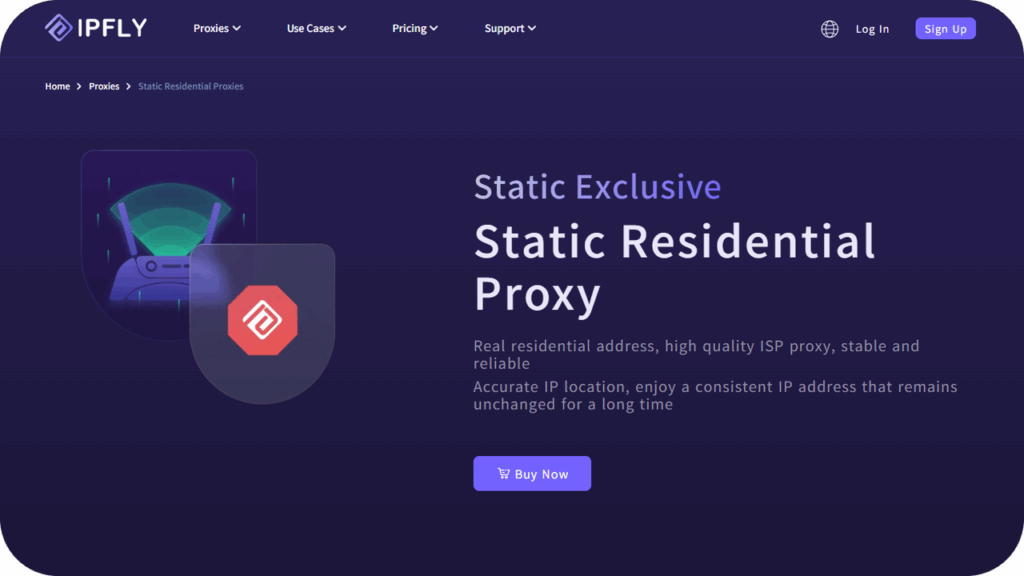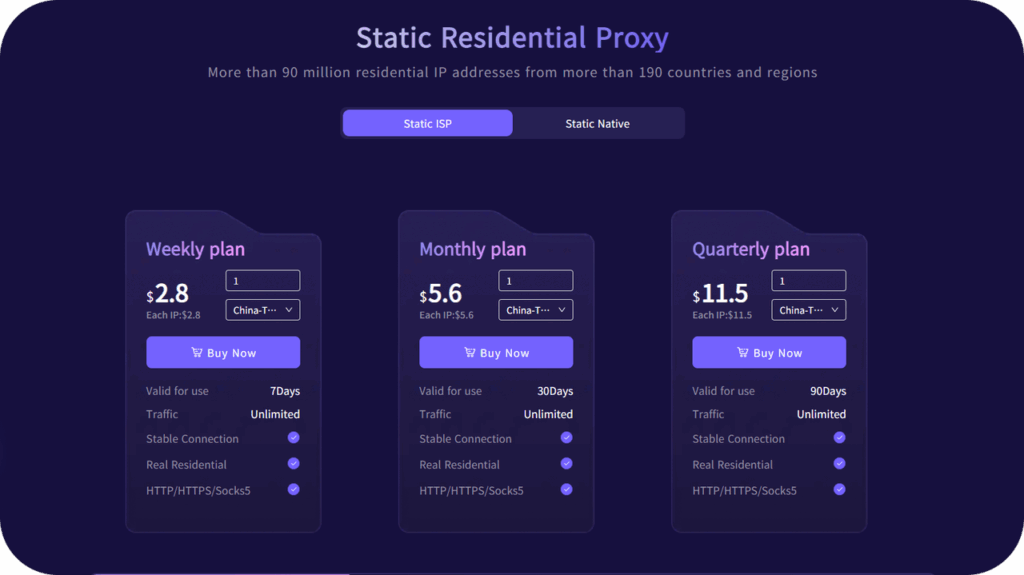In the global digital era, geo-restrictions have become a major hurdle for accessing overseas content and conducting cross-border business. Node Unblockers, which simulate network nodes in target regions, help users bypass IP blocks and efficiently access restricted resources. This article explains the core principles, use cases, and premium solutions for Node Unblockers, guiding you to choose the right node services and overcome geo-barriers.

What Is a Node Unblocker? Core Principles and Features
Basics and Working Mechanism
Node
A proxy server located globally that forwards user requests and hides real IPs.
Unblocker
Connects to a node in the target region, making the target server recognize the user as local (e.g., accessing Netflix US via a US node).
Core Principle
User → Node Server → Target Website, replacing the real IP with a node IP to bypass geo-detection.
Key Functional Advantages
Global Node Coverage
Supports nodes in 190+ countries/regions (e.g., IPFLY offers 90+ million global nodes) for precise regional access.
Dynamic IP Rotation
Switches node IPs per request or schedule to avoid blocks (e.g., changing Japanese node IP every 10 minutes).
Protocol Compatibility
Supports HTTP/HTTPS/Socks5 for browsers, crawlers, and enterprise systems.
Core Use Cases for Node Unblockers
Streaming and Entertainment Unblocking
Scenario
Watching Netflix US exclusives, HBO Max Europe content, or region-locked Twitch streams.
Solution
Static residential nodes (e.g., New York, US) for long-term stable access, preventing account issues from IP changes.
Cross-Border E-Commerce and Market Research
Scenario
Monitoring Amazon US prices, scraping Shopee Southeast Asia data, managing multi-region social media accounts (e.g., TikTok Japan).
Solution
Dynamic residential nodes rotation (e.g., changing Southeast Asia IPs per request) to reduce anti-crawl detection.
Enterprise-Level Cross-Border Operations
Scenario
Multinational employees accessing headquarters’ internal systems (region-specific IP authentication), financial institutions retrieving real-time overseas data.
Solution
Dedicated datacenter nodes (e.g., high-speed European nodes) for low-latency and high-concurrency tasks.
How to Choose an Efficient Node Unblocker?
Node Quality Is Critical
Residential vs. Datacenter Nodes:
| Metric | Residential Nodes (Recommended) | Datacenter Nodes |
| Anonymity | Real ISP-assigned, hard to detect | Easily flagged as “datacenter IP” |
| Stability | 99.9%+ uptime for long-term tasks | Suitable for short-term high-speed access |
| Cost | Moderate ($19.99/month for IPFLY basic) | Lower cost for non-strict anti-crawl |
Recommendation
Prioritize a hybrid solution with residential nodes as the mainstay (IPFLY supports custom node combinations).
Geographic Coverage and Node Density
Ensure sufficient nodes in target regions (e.g., UAE and Saudi nodes for Middle East markets) to avoid connection failures.
Technical Support and Compliance
24/7 Support
Quick node replacement for failures (IPFLY offers real-time node monitoring and auto-switching).
Privacy Compliance
Choose providers with “no logging” policies and GDPR/CCPA compliance (IPFLY is internationally certified for data security).
IPFLY Node Unblocker Solutions: Full-Scenario Node Network
As a global leader in node services, IPFLY offers three core node types for comprehensive Unblocker solutions:
Static Residential Nodes: Stability First
Advantages:
Fixed-region real IPs (e.g., London, UK) for long-term stable identities (e.g., registering and managing UK Amazon accounts).
Supports HTTP/HTTPS/Socks5 for manual browser setup and enterprise API integration.
Use Cases:
Long-term cross-border e-commerce store operations, social media account matrix management (e.g., daily Facebook US account maintenance).
Dynamic Residential Nodes: Essential for High-Frequency Tasks
Advantages:
90+ million global dynamic residential IPs, filterable by country/city (e.g., only Vancouver, Canada nodes).
Millisecond response with auto-IP rotation to avoid anti-crawl (e.g., switching nodes every 50 requests to reduce TikTok detection).
Use Cases:
Data scraping (e.g., indeed US job data collection), SEO keyword rank monitoring (multi-region search engine results).
Dedicated Datacenter Nodes: High-Speed Priority
Advantages:
Exclusive high-speed nodes with <80ms average latency (e.g., Frankfurt, Germany nodes for European servers), ideal for speed-sensitive tasks (e.g., real-time Netflix 4K streaming).
Unlimited bandwidth for high concurrency, boosting enterprise-level batch operations by 30%+.
Use Cases:
Automated testing (e.g., multi-region APP compatibility testing), streaming content unblocking (fast-loading 4K videos).
Node Unblocker Setup Guide: Using IPFLY as an Example
Step 1: Registration and Plan Selection
Visit https://www.ipfly.net, choose node types based on needs (e.g., “Dynamic Residential Nodes – Asia Plan”).
New users get 10 free nodes for testing target-region connection success (recommend testing 3+ nodes).
Step 2: Node Configuration Methods
Manual Browser Setup (Chrome Example)
Go to “Settings → Advanced → System → Open proxy settings”.
Enter IPFLY node IP and port in “Manual proxy configuration” (supports Socks5/HTTP).
Step 3: Node Effect Verification
Confirm IP location via tools like WhatIsMyIP to match the target region.
Test download speed with SpeedTest (ideal: residential nodes >10Mbps, datacenter nodes >50Mbps).

Node Unblocker Pitfalls to Avoid
Prevent “Node Abuse” Blocks
Limit request frequency per node (<100 requests/minute) and add random delays (5-10 seconds) to mimic real user behavior.
Differentiate Between “Node Unblocker” and “VPN”
Node Unblockers focus on IP-level regional simulation for precise app/tool control;
VPNs change the entire device’s network, potentially affecting local services (e.g., bank app geo-detection).
Choose “Pay-as-You-Go” Billing
Avoid fixed-bandwidth waste; opt for “10GB/month” plans (IPFLY basic plan at $19.99) for low-frequency use.
Efficient Geo-Unblocking Starts with Premium Nodes
Node Unblockers are core tools to bypass geo-restrictions, with effectiveness relying on node quality, coverage, and support. IPFLY stands out with its massive pure node pool, flexible plans, and enterprise stability, making it ideal for individuals and businesses.

To enhance the performance and security of Node Unblocker, visit the IPFLY official website to learn more and experience its premium proxy services.


